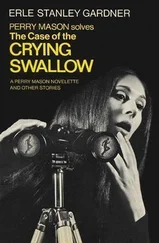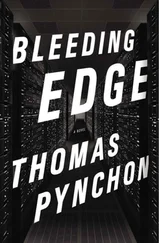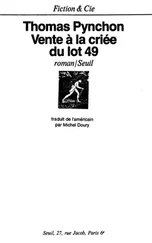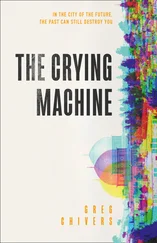She pulled into the drive at Hilarius's clinic a little after sunset. The light in his office didn't seem to be on. Eucalyptus branches blew in a great stream of air that flowed downhill, sucked to the evening sea. Halfway along the flagstone path, she was startled by an insect whirring loudly past her ear, followed at once by the sound of a gunshot. That was no insect, thought Oedipa, at which point, hearing another shot, she made the connection. In the fading light she was a clear target; the only way to go was toward the clinic. She dashed up to the glass doors, found them locked, the lobby inside dark. Oedipa picked up a rock next to a flower bed and heaved it at one of the doors. It bounced off. She was looking around for another rock when a white shape appeared inside, fluttering up to the door and unlocking it for her. It was Helga Blamm, Hilarius's sometime assistant.
"Hurry," she chattered, as Oedipa slipped inside. The woman was close to hysterical.
"What's happening?" Oedipa said.
"He's gone crazy. I tried to call the police, but he took a chair and smashed the switchboard with it."
"Dr Hilarius?"
"He thinks someone's after him." Tear streaks had meandered down over the nurse's cheekbones. "He's locked himself in the office with that rifle." A Gewehr 43, from the war, Oedipa recalled, that he kept as a souvenir.
"He shot at me. Do you think anybody will report it?"
"Well he's shot at half a dozen people," replied Nurse Blamm, leading Oedipa down a corridor to her office. "Somebody better report it." Oedipa noticed that the window opened on a safe line of retreat.
"You could've run," she said.
Blamm, running hot water from a washbasin tap into cups and stirring in instant coffee, looked up, quizzical. "He might need somebody."
"Who's supposed to be after him?"
"Three men with submachine guns, he said. Terrorists, fanatics, that was all I got. He started breaking up the PBX." She gave Oedipa a hostile look. "Too many nutty broads, that's what did it. Kinneret is full of nothing but. He couldn't cope."
"I've been away for a while," Oedipa said. "Maybe I could find out what it is. Maybe I'd be less of a threat for him." Blamm burned her mouth on the coffee. "Start telling him your troubles and he'll probably shoot you."
In front of his door, which she could never remember having seen closed, Oedipa stood hipshot awhile, questioning her own sanity. Why hadn't she split out through Blamm's window and read about the rest of it in the paper?
"Who is it?" Hilarius screamed, having picked up her breathing, or something.
"Mrs Maas."
"May Speer and his ministry of cretins rot eternally in hell. Do you realize that half these rounds are duds?"
"May I come in? Could we talk?"
"I'm sure you'd all like that," Hilarius said.
"I'm unarmed. You can frisk me."
"While you karate-chop me in the spine, no thank you."
"Why are you resisting every suggestion I make?"
"Listen," Hilarius said after awhile, "have I seemed to you a good enough Freudian? Have I ever deviated seriously?"
"You made faces now and then," said Oedipa, "but that's minor."
His response was a long, bitter laugh. Oedipa waited. "I tried," the shrink behind the door said, "to submit myself to that man, to the ghost of that cantankerous Jew. Tried to cultivate a faith in the literal truth of everything he wrote, even the idiocies and contradictions. It was the least I could have done, nicht wahr? A kind of penance.
"And part of me must have really wanted to believe
– like a child hearing, in perfect safety, a tale of horror
– that the unconscious would be like any other room, once the light was let in. That the dark shapes would resolve only into toy horses and Biedermeyer furniture. That therapy could tame it after all, bring it into society with no fear of its someday reverting. I wanted to believe, despite everything my life had been. Can you imagine?"
She could not, having no idea what Hilarius had done before showing up in Kinneret. Far away she now heard sirens, the electronic kind the local cops used, that sounded like a slide-whistle being played over a PA. system. With linear obstinacy they grew louder.
"Yes, I hear them," Hilarius said. "Do you think anyone can protect me from these fanatics? They walk through walls. They replicate: you flee them, turn a corner, and there they are, coming for you again."
"Do me a favor?" Oedipa said. "Don't shoot at the cops, they're on your side."
"Your Israeli has access to every uniform known," Hilarius said. "I can't guarantee the safety of the 'police.' You couldn't guarantee where they'd take me if I surrendered, could you."
She heard him pacing around his office. Unearthly siren-sounds converged on them from all over the night. "There is a face," Hilarius said, "that I can make. One you haven't seen; no one in this country has. I have only made it once in my life, and perhaps today in central Europe there still lives, in whatever vegetable ruin, the young man who saw it. He would be, now, about your age. Hopelessly insane. His name was Zvi. Will you tell the 'police,' or whatever they are calling themselves tonight, that I can make that face again? That it has an effective radius of a hundred yards and drives anyone unlucky enough to see it down forever into the darkened oubliette, among the terrible shapes, and secures the hatch irrevocably above them? Thank you."
The sirens had reached the front of the clinic. She heard car doors slamming, cops yelling, suddenly a great smash as they broke in. The office door opened then. Hilarius grabbed her by the wrist, pulled her inside, locked the door again.
"So now I'm a hostage," Oedipa said.
"Oh," said Hilarius, "it's you."
"Well who did you think you'd been-"
"Discussing my case with? Another. There is me, there are the others. You know, with the LSD, we're finding, the distinction begins to vanish. Egos lose their sharp edges. But I never took the drug, I chose to remain in relative paranoia, where at least I know who I am and who the others are. Perhaps that is why you also refused to participate, Mrs Maas?" He held the rifle at sling arms and beamed at her. "Well, then. You were supposed to deliver a message to me, I assume. From them. What were you supposed to say?"
Oedipa shrugged. "Face up to your social responsibilities," she suggested. "Accept the reality principle. You're outnumbered and they have superior firepower."
"Ah, outnumbered. We were outnumbered there too." He watched her with a coy look.
"Where?"
"Where I made that face. Where I did my internship."
She knew then approximately what he was talking about, but to narrow it said, "Where," again.
"Buchenwald," replied Hilarius. Cops began hammering on the office door.
"He has a gun," Oedipa called, "and I'm in here."
"Who are you, lady?" She told him. "How do you spell that first name?" He also took down her address, age, phone number, next of kin, husband's occupation, for the news media. Hilarius all the while was rummaging in his desk for more ammo. "Can you talk him out of it?" the cop wanted to know. "TV folks would like to get some footage through the window. Could you keep him occupied?"
"Hang tough," Oedipa advised, "we'll see." "Nice act you all have there," nodded Hilarius. "You think," said Oedipa, "then, that they're trying to bring you back to Israel, to stand trial, like they did Eichinann?" The shrink kept nodding. "Why? What did you do at Buchenwald?"
"I worked," Hilarius told her, "on experimentally-induced insanity. A catatonic Jew was as good as a dead one. Liberal SS circles felt it would be more humane." So they had gone at their subjects with metronomes, serpents, Brechtian vignettes at midnight, surgical removal of certain glands, magic-lantern hallucinations, new drugs, threats recited over hidden loudspeakers, hypnotism, clocks that ran backward, and faces. Hilarius had been put in charge of faces. "The Allied liberators," he reminisced, "arrived, unfortunately, before we could gather enough data. Apart from the spectacular successes, like Zvi, there wasn't much we could point to in a statistical way." He smiled at the expression on her face. "Yes, you hate me. But didn't I try to atone? If I'd been a real Nazi I'd have chosen Jung, nicht wahr? But I chose Freud instead, the Jew. Freud's vision of the world had no Buchenwalds in it. Buchenwald, according to Freud, once the light was let in, would become a soccer field, fat children would learn flower-arranging and solfeggio in the strangling rooms. At Auschwitz the ovens would be converted over to petit fours and wedding cakes, and the V-2 missiles to public housing for the elves. I tried to believe it all. I slept three hours a night trying not to dream, and spent the other 21 at the forcible acquisition of faith. And yet my penance hasn't been enough. They've come like angels of death to get me, despite all I tried to do."
Читать дальше












